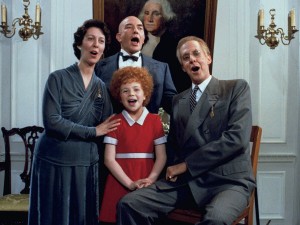Election Day Movies: Presidents
Posted on November 8, 2016 at 7:00 am
After you vote, take a break from red and blue maps to enjoy some of the portrayals of real US Presidents on screen.
Daniel Day-Lewis won an Oscar for Lincoln. I’ve already written about some of the many other movie versions of Lincoln’s life. “Wilson” stars Oscar nominee Alexander Knox in a dignified tribute to the 29th President. Gary Sinese gave a powerful performance in the HBO movie, Truman. Rough Riders
has Tom Berenger as Theodore Roosevelt, leading Cuban rebels against Spain.
 Perhaps the most fanciful portrayal of a real US President is “The Remarkable Andrew,” with William Holden as an honorable accountant who discovers a discrepancy in the town books and is visited by the ghost of his favorite President, Andrew Jackson (Brian Donlevy), who provides guidance and support.
Perhaps the most fanciful portrayal of a real US President is “The Remarkable Andrew,” with William Holden as an honorable accountant who discovers a discrepancy in the town books and is visited by the ghost of his favorite President, Andrew Jackson (Brian Donlevy), who provides guidance and support.
President Kennedy’s WWII experience was the subject of PT 109, starring Cliff Robertson. He was also the subject of 13 Days, about the Cuban missile crisis. Oliver Stone has directed movies about Nixon, played by Anthony Hopkins (who also played a memorably cagy John Quincy Adams in “Amistad”), and George W. Bush, played by Josh Brolin. President Nixon has been portrayed in a number of other films, from the acclaimed Frost/Nixon to the humorous but touching Elvis and Nixon and the wild satire Dick. And of course he is the subject of the Oscar-winning Best Picture All the President’s Men, though he is only glimpsed in archival footage.
The Butler is based on the true story of a man who worked in the White House for eight Presidents, and we see everyone from Eisenhower to Reagan portrayed in the film. Of course Reagan himself was an actor before he went into politics. His best films include “King’s Row” (his own favorite), “Hellcats of the Navy” (co-starring with Nancy Reagan), and, yes, “Bedtime for Bonzo.”
There are some great President movies made for television: Gary Sinese gave a superb performance in Truman and Bryan Cranston was outstanding in the role he originated on Broadway, Lyndon Johnson in All the Way.
President and Mrs. Obama were portrayed in a film about their first date this year, Southside With You. (For the real story of what happened that night, see this adorable column by my dad, who was there.) “Barry,” another movie about Barack Obama’s early years, will be out soon.
According to TIME Magazine, Lincoln has been portrayed most frequently on screen but perhaps the President most memorable on film is Franklin Roosevelt, the only man to be elected four times, with Sunrise At Campobello, Eleanor and Franklin and its sequel
, Warm Springs
, Hyde Park on Hudson, and, of course, Annie
! (TIME notes that the only US President never to show up as a character in a movie is Warren G. Harding.)


